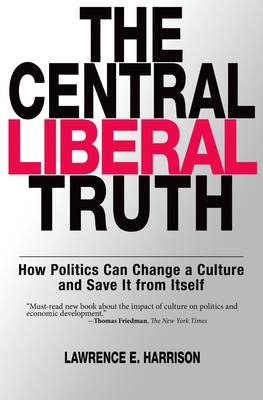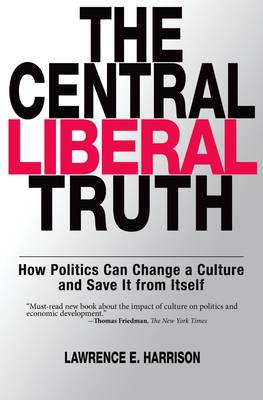
Je cadeautjes zeker op tijd in huis hebben voor de feestdagen? Kom langs in onze winkels en vind het perfecte geschenk!
- Afhalen na 1 uur in een winkel met voorraad
- Gratis thuislevering in België vanaf € 30
- Ruim aanbod met 7 miljoen producten
Je cadeautjes zeker op tijd in huis hebben voor de feestdagen? Kom langs in onze winkels en vind het perfecte geschenk!
- Afhalen na 1 uur in een winkel met voorraad
- Gratis thuislevering in België vanaf € 30
- Ruim aanbod met 7 miljoen producten
Zoeken
The Central Liberal Truth
How Politics Can Change a Culture and Save It from Itself
Lawrence E Harrison
Paperback | Engels
€ 45,45
+ 90 punten
Omschrijving
Which cultural values, beliefs, and attitudes best promote democracy, social justice, and prosperity? How can we use the forces that shape cultural change, such as religion, education, and political leadership, to promote these values in the Third World--and for underachieving minorities in the First World? In this book, Lawrence E. Harrison offers intriguing answers to these questions, in a valuable follow-up to his acclaimed Culture Matters.
Drawing on a three-year research project that explored the cultural values of dozens of nations--from Botswana, Sweden, and India to China, Egypt, and Chile--Harrison offers a provocative look at values around the globe, revealing how each nation's culture has propelled or retarded their political and economic progress. The book presents 25 factors that operate very differently in cultures prone to progress and those that resist it, including one's influence over destiny, the importance attached to education, the extent to which people identify with and trust others, and the role of women in society. Harrison pulls no punches, and many of his findings are controversial.
Contradicting the arguments of multiculturalists, this book contends that when it comes to promoting human progress, some cultures are clearly more effective than others. It convincingly shows which values, beliefs, and attitudes work and how we can foster them. "Harrison takes up the question that is at the center of politics today: Can we self-consciously change cultures so they encourage development and modernization?"
--David Brooks, New York Times "I can think of no better entrance to the topic, both for what it teaches and the way it invites and prepares the reader to continue. A gateway study."
--David S. Landes, author of The Wealth and Poverty of Nations
Drawing on a three-year research project that explored the cultural values of dozens of nations--from Botswana, Sweden, and India to China, Egypt, and Chile--Harrison offers a provocative look at values around the globe, revealing how each nation's culture has propelled or retarded their political and economic progress. The book presents 25 factors that operate very differently in cultures prone to progress and those that resist it, including one's influence over destiny, the importance attached to education, the extent to which people identify with and trust others, and the role of women in society. Harrison pulls no punches, and many of his findings are controversial.
Contradicting the arguments of multiculturalists, this book contends that when it comes to promoting human progress, some cultures are clearly more effective than others. It convincingly shows which values, beliefs, and attitudes work and how we can foster them. "Harrison takes up the question that is at the center of politics today: Can we self-consciously change cultures so they encourage development and modernization?"
--David Brooks, New York Times "I can think of no better entrance to the topic, both for what it teaches and the way it invites and prepares the reader to continue. A gateway study."
--David S. Landes, author of The Wealth and Poverty of Nations
Specificaties
Betrokkenen
- Auteur(s):
- Uitgeverij:
Inhoud
- Aantal bladzijden:
- 288
- Taal:
- Engels
Eigenschappen
- Productcode (EAN):
- 9780195331806
- Verschijningsdatum:
- 8/07/2008
- Uitvoering:
- Paperback
- Formaat:
- Trade paperback (VS)
- Afmetingen:
- 155 mm x 235 mm
- Gewicht:
- 449 g

Alleen bij Standaard Boekhandel
+ 90 punten op je klantenkaart van Standaard Boekhandel
Beoordelingen
We publiceren alleen reviews die voldoen aan de voorwaarden voor reviews. Bekijk onze voorwaarden voor reviews.









